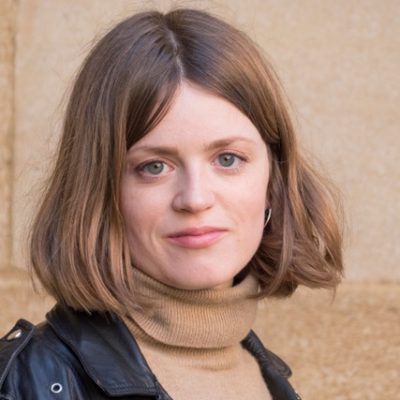Interview with Annina Loets
by Emily Fletcher

Emily: Where are you from?
Annina: I’m from Hamburg, Germany. I left when I was 18, after finishing high school, and spent some time in France. Then I moved to Berlin, and after that I spent a lot of time in Berlin and the UK.
Emily: How did you discover philosophy?
Annina: In school. It was the standard story of a very good philosophy teacher in high school. I was fascinated by the new and peculiar way of thinking about things. Although I did have some talent for philosophy, it took more work for me to get really good grades. So it was attainable, but still a challenge.
Emily: That’s an intoxicating combination. So, how did you decide to pursue philosophy academically?
Annina: Initially, I wanted to be a journalist. I worked for student papers, and I was very politically interested. I did a bunch of internships, after I graduated from high school, and then I no longer wanted to be a journalist. Basically, I found it too boring. But I still liked politics, and I wanted to move to Berlin, because it was an exciting city. I ended up doing philosophy due to a contingency of the programs in Berlin. At Humboldt University you could do a philosophy major with a politics minor, and at the other university you could do only plain politics, with no minor. Since I also liked philosophy, I went to Humboldt, but I ended up doing only philosophy, because the politics teaching was really bad. So I got sucked into philosophy and never looked back, I suppose.
Emily: If journalism was too boring, what do you find more exciting about philosophy?
Annina: What I found boring about journalism was the shallowness of the reporting and not getting into any detail. What I find exciting about philosophy is to see how much detail there can be. I guess a lot of people look at philosophy and get frustrated when they realize that the devil is in the details, but for me that was really exciting. Even with the simplest thing you quickly realize how many moving parts there are, and how just by turning one little screw this way and another screw that way, you get a completely different picture. I found that really stimulating. I also liked the intellectual honesty in philosophy, that you’re encouraged not to cover up what you don’t know, but you’re actually encouraged to uncover and articulate clearly what you don’t understand.
Emily: What are you currently working on?
Annina: I have two big projects. One came out of my dissertation research, which was on a certain kind of qualified speech, where you ascribe properties to individuals relative to a role or an identity. For example, when you say that Emily has different responsibilities as a chair than she has as a mother. I wrote my dissertation about these types of qualifications. I recently applied this work to intersectionality, considering, for example, what it would be to be disadvantaged as a woman while being privileged as a white person. I’m interested in expanding this work to discuss more generally the relation between relativized and unrelativized properties, for instance the relation between relative and absolute goodness.
I’m also really interested in ability. I’ve done a bunch of work on the metaphysics and semantics of ability, and in particular the relation between ability and possibility, as well as about the relation between ability and compulsion. Right now, I’m thinking a bit about generic ability ascriptions, as in “Emily can bake cakes”, as opposed to “Emily can bake a cake today”. Many people seem to think that ability ascriptions like “Emily can swim” are tacitly generic, but at least on the face of it, they look quite different to ability ascriptions embedding typical generics. There are some interesting and puzzling questions there.
Emily: Is there a clear distinction between your work and personal life, or do your skills and dispositions as a philosopher spill over into your personal life?
Annina: To some extent they do, and sometimes it’s an advantage and sometimes a disadvantage. Here is a disadvantage: sometimes when I read a newspaper article, I only remember the structure of what happened: they tried to pass a bill, one person opposed the bill and got others to oppose it and in the end it wasn’t passed. But I can’t tell you the names of the politicians, the State, or other such details. I think that’s a deficiency from becoming so used to thinking about things structurally.
Emily: What are your first impressions of Madison?
Annina: I really like Madison. It still has a bit of a feel of a European city, because it’s more condensed due to the Isthmus and the two lakes. I like that you can walk places, and there are lots of bars, restaurants, and cyclists. I really appreciate the Midwesterners, I think they’re lovely. I feel like it makes me a nicer person too, because you adapt to the general mood. In Berlin, people are often complaining and mean, and so you also become complaining and mean. Here everyone’s always upbeat and cheerful and kind, so you also become a bit more upbeat, cheerful, and kind.